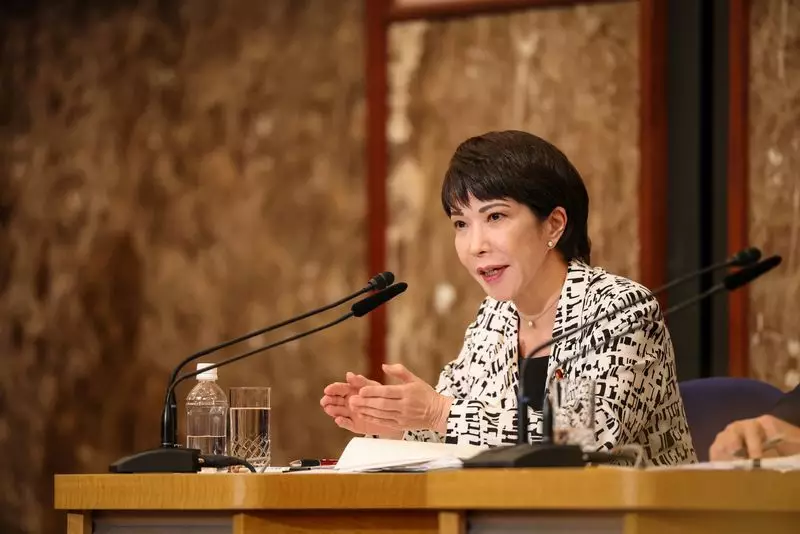As Japan navigates its way through a delicate economic recovery, the discourse surrounding interest rates and monetary policy has become increasingly prominent. One of the leading voices in this conversation is Sanae Takaichi, who serves as the minister responsible for economic security. During a recent news conference, she underscored the necessity of maintaining ultra-low interest rates, a stance reflective of her broader intentions as she positions herself as a key candidate in the ruling Liberal Democratic Party (LDP) leadership race. Her assertions prompt critical examination of the Bank of Japan’s (BOJ) recent policy shifts and the wider implications for the country’s economic landscape.
Takaichi’s firm conviction that the BOJ should keep interest rates low stems from her belief that the ongoing economic recovery remains fragile. She articulated her perspective, questioning the timing of the central bank’s recent decisions to hike interest rates. In her view, it is premature to pull back on monetary stimulus when economic indicators suggest that the recovery remains unstable. Her comments reflect a growing concern among politicians and economists alike about the potential repercussions of rate increases in an economy already grappling with a multitude of challenges, including rising living costs and a hefty public debt.
The BOJ’s decision to abandon negative interest rates marks a significant pivot in its approach, initiating a complex dialogue on the balance between fostering economic stability and managing inflation. This delicate interplay is pivotal as the BOJ aims to achieve its target inflation rate of 2%. BOJ Governor Kazuo Ueda has indicated a willingness to raise rates further, should inflation remain stable, but these policies must be synchronized with solid wage growth to ensure a sustainable recovery.
As the various candidates for LDP leadership outlined their economic platforms, one prominent contrast emerged between the mainstream proposals for increased government spending and the less conventional views of Taro Kono, the minister in charge of digital modernization. Kono’s perspective challenges the efficacy of subsidies and increased spending as reliable means to stimulate economic growth. He urges a greater focus on improving fiscal health rather than defaulting to traditional remedies such as public expenditure increases. This is particularly salient in light of Japan’s formidable public debt, which necessitates meticulous financial planning as the country confronts rising interest rates.
In discussions about fiscal strategy, another candidate, Toshimitsu Motegi, raised the issue of utilizing Japan’s substantial reserves set aside for currency intervention. By exploring alternative investments, Motegi suggested that Japan could potentially better capitalize on these resources, balancing the need for fiscal flexibility with the investment strategy required to sustain its economy.
The ongoing leadership race within the LDP is poised to have far-reaching repercussions on Japan’s economic trajectory. With incumbent Prime Minister Fumio Kishida announcing his intention to step down, the outcome of the leadership contest scheduled for September 27 could redefine policy approaches in key areas. The new leader’s stance on fiscal matters, interest rates, and the broader economic strategy will be closely scrutinized not only by political advisors but also by international investors looking for signals on Japan’s economic direction.
The aspirations of the LDP candidates, particularly in light of their differing viewpoints on fiscal responsibility, will shape not just Japan’s domestic landscape but also its global economic interactions. Economists’ expectations of further BOJ rate hikes this year, particularly a projected increase in December, highlight an urgency for robust fiscal strategies. Should candidates fail to present coherent plans that address rising living costs while fostering sustainable economic growth, Japan may face heightened challenges in cementing its post-COVID recovery.
As the situation continues to evolve, Japan finds itself at a critical juncture. The interplay of leadership choices, monetary policy, and fiscal strategy will dictate the trajectory of the nation’s economic recovery. The compelling arguments put forth by Takaichi, Kono, and other candidates signify a diverse political landscape, but they also expose the intricate challenges ahead. It remains essential for Japan to strike the right balance in its economic policies—one that reinforces growth yet navigates the complexities of an ever-evolving financial environment. Only time will tell how these dynamic forces will shape Japan’s economic future.

